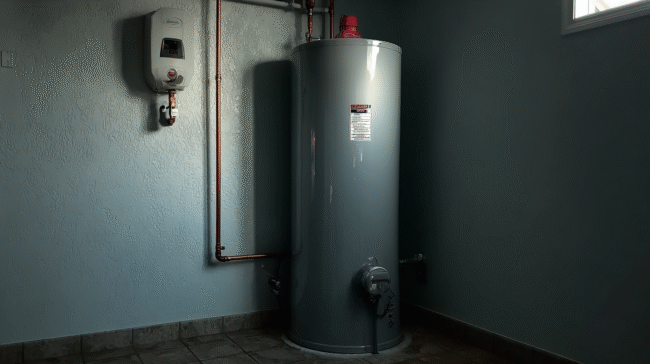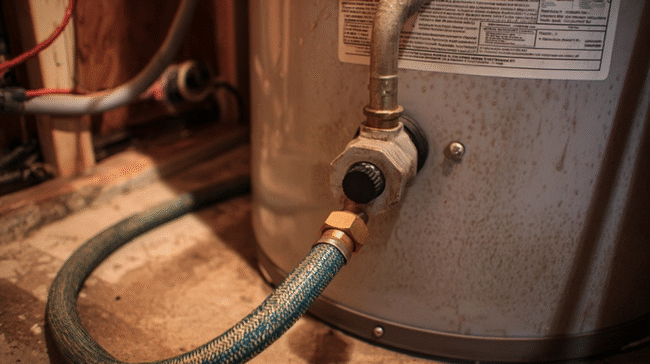
You’re sitting at home, the house is quiet, and suddenly you hear it – a loud bang or a strange bubbling sound from the corner where your water heater sits. It’s not the kind of noise you can ignore, and once you hear it, you’re probably asking yourself, “Why does my water heater make noise?”
For many homeowners, this isn’t an unfamiliar question. Water heaters can start making various sounds over time. While some are harmless, others can point to bigger issues inside the tank. The key is knowing which noise means what and when it’s time to act.
In this guide, we’ll walk you through the common reasons why your water heater makes noise, how to identify the issue, whether you can fix it yourself, and when it’s best to call a plumber. If you’ve ever worried that your water heater was about to give out, you’re not alone, and you’re in the right place to get answers.
Is it normal for a water heater to make noise?
A little bit of noise from your water heater isn’t unusual. You may occasionally hear a faint humming or soft hiss, especially when the burner is on or the tank is filling. These sounds usually don’t mean anything’s wrong.
But if you start hearing loud popping, rumbling, banging, or high-pitched squealing, something’s changed. These types of noises typically indicate an issue within the system, often due to buildup, pressure problems, or worn-out parts.
Ignoring these sounds doesn’t make them go away. In fact, they usually get worse. According to the Department of Energy’s water heater maintenance guidelines, understanding these warning signs can help you avoid more significant problems, such as leaks or breakdowns.
Common water heater noises and what they mean
Water heaters tend to speak up when something inside isn’t right. Below are some of the most common noises you’ll hear, along with what they typically indicate.
Popping or banging
If it sounds like popcorn popping, there’s a good chance you’re dealing with sediment buildup. Over time, minerals in your water settle at the bottom of the tank. When the heating element tries to heat water through this layer of sediment, steam bubbles get trapped and pop loudly.
This is especially common in areas with hard water. The longer it goes without flushing, the worse the buildup gets. Eventually, the noise gets louder and more frequent.
Rumbling
A deep, rumbling sound is usually a sign that the sediment issue has gotten worse. As water heats and moves around the mineral deposits, it creates a rumbling noise. This doesn’t just make the heater loud. It also reduces its efficiency and makes it work harder than it should.
In some cases, the sediment layer gets so thick that it causes overheating, shortens the unit’s lifespan, or leads to leaks.
Ticking or tapping
Small changes in water pressure or thermal expansion often cause ticking sounds. As the tank heats up, metal parts inside expand slightly and may rub or tap against other surfaces.
This isn’t always serious. Sometimes it’s just a matter of a loose pipe or a check valve that needs adjusting. However, if the ticking worsens, it may indicate that a component is wearing out.
Hissing or sizzling
Hissing sounds are usually caused by water leaking onto a hot surface inside the heater. It might be a loose valve, a damaged pipe, or even a small leak from the tank itself. If you hear sizzling and notice moisture or rust stains near the heater, that’s a red flag.
Water and electricity don’t mix, so this is one sound you don’t want to ignore.
Screeching or high-pitched whining
This type of noise typically indicates that water flow is restricted. It could be a partially closed valve or a buildup at the inlet. As water tries to force its way through a tight space, it creates that high-pitched whine.
The fix might be simple, like opening a valve fully or clearing out mineral deposits. But if the noise continues, it’s time to take a closer look.

Can I fix the problem myself?
Some water heater noises can be resolved with a bit of basic maintenance. Here are a few steps you can safely try on your own:
- Flush the tank: This is one of the best ways to get rid of sediment. You’ll need a garden hose, a bucket, and access to a drain. Turn off the power or gas, connect the hose to the drain valve, and let the tank empty out. Then briefly turn the cold water back on to flush remaining sediment.
- Check for loose straps or pipes: If you hear tapping or ticking, inspect the pipes and straps around the tank. A few adjustments or some foam padding can quiet things down.
- Inspect the valves: If you suspect a screeching noise is coming from a partially closed valve, make sure your inlet and outlet valves are fully open. Also, check for any mineral buildup around the openings.
However, if you hear hissing, see water around the base, or smell gas (in the case of a gas heater), don’t take chances. These are signs that need professional attention.
If the noise persists after flushing or adjusting parts, it may indicate a more serious internal issue. In that case, it’s best to get help from someone who handles water heater repair and installation services every day.
Are noisy water heaters dangerous?
The sound itself might not hurt anything, but the cause behind it can. Sediment buildup, for example, not only makes the heater noisy but also increases pressure inside the tank. If this pressure gets too high, it can damage the tank or even trigger the safety valve to release.
Leaks caused by worn parts or rust can also lead to water damage around your home. And if you have an electric heater and there’s moisture involved, there’s a real risk of short circuits.
Gas water heaters can be even more dangerous if a faulty part causes improper combustion or gas leaks. The EPA’s safety guidelines for water heaters emphasize the importance of proper ventilation and regular maintenance to prevent carbon monoxide issues.
So while a noisy heater isn’t always urgent, it should never be ignored. It’s a signal that something needs attention, and catching it early can save you a lot of time, money, and stress.
What if the noise comes back again?
Even after you’ve flushed the tank or tightened a few fittings, the noise might return. This can be frustrating, especially if you’ve already spent time trying to resolve the issue.
If the sound comes back quickly, it often means the issue wasn’t fully resolved. In the case of sediment, a single flush may not be enough, especially if the buildup has hardened over time. Repeated noises after basic maintenance may also signal deeper problems, such as a failing heating element or corrosion within the tank lining.
Another reason noises might return is inconsistent water quality. If your area has hard water, mineral deposits can re-form within weeks. Without a water softening system or regular maintenance, the cycle repeats itself.
Persistent noise is also a sign that your water heater may be nearing the end of its service life. Most units last around 8 to 12 years. If yours is within that range and continues to act up, it might be more cost-effective to consider a replacement rather than repeat repairs.
Before jumping to that decision, qualified water heater specialists can run a proper inspection and let you know if it’s repairable or if a new system would be more innovative.
A quieter home starts with a healthy water heater
No one likes unexpected noises in their home, especially when they come from something as essential as the water heater. It’s easy to dismiss the sounds at first, but over time, they can get louder, more frequent, and more costly to ignore.
Whether it’s a soft hiss, a sharp bang, or a deep rumble, your water heater is giving you clues. The sooner you listen and act, the better your chances of solving the issue before it grows.
Understanding why your water heater makes noise helps you make informed decisions about maintenance and repairs. Routine care, yearly flushing, and the occasional check-up can go a long way in keeping your system in good shape. However, when the sounds become overwhelming or you’re unsure about what to do, seeking help from experienced professionals is the safest option.
